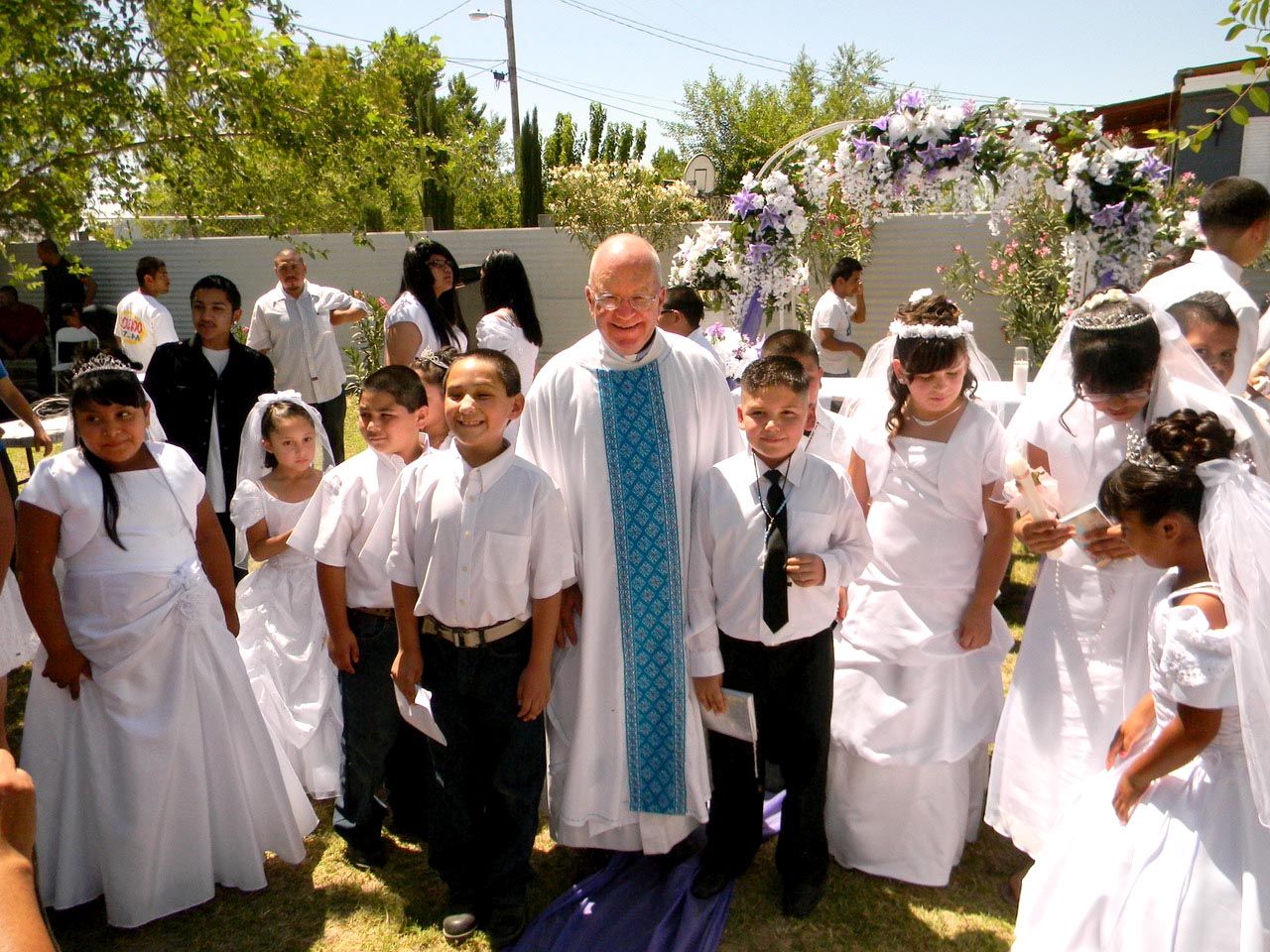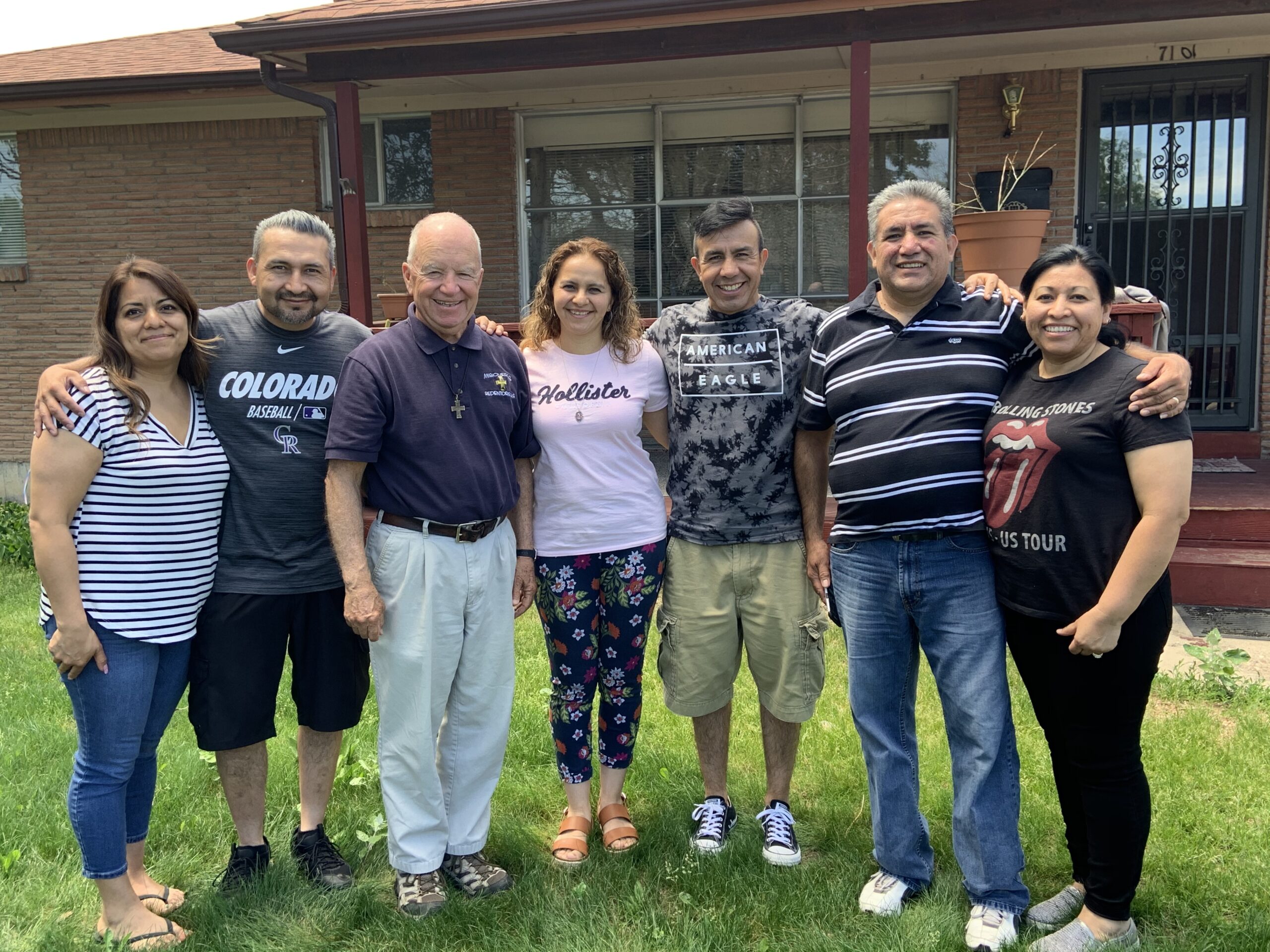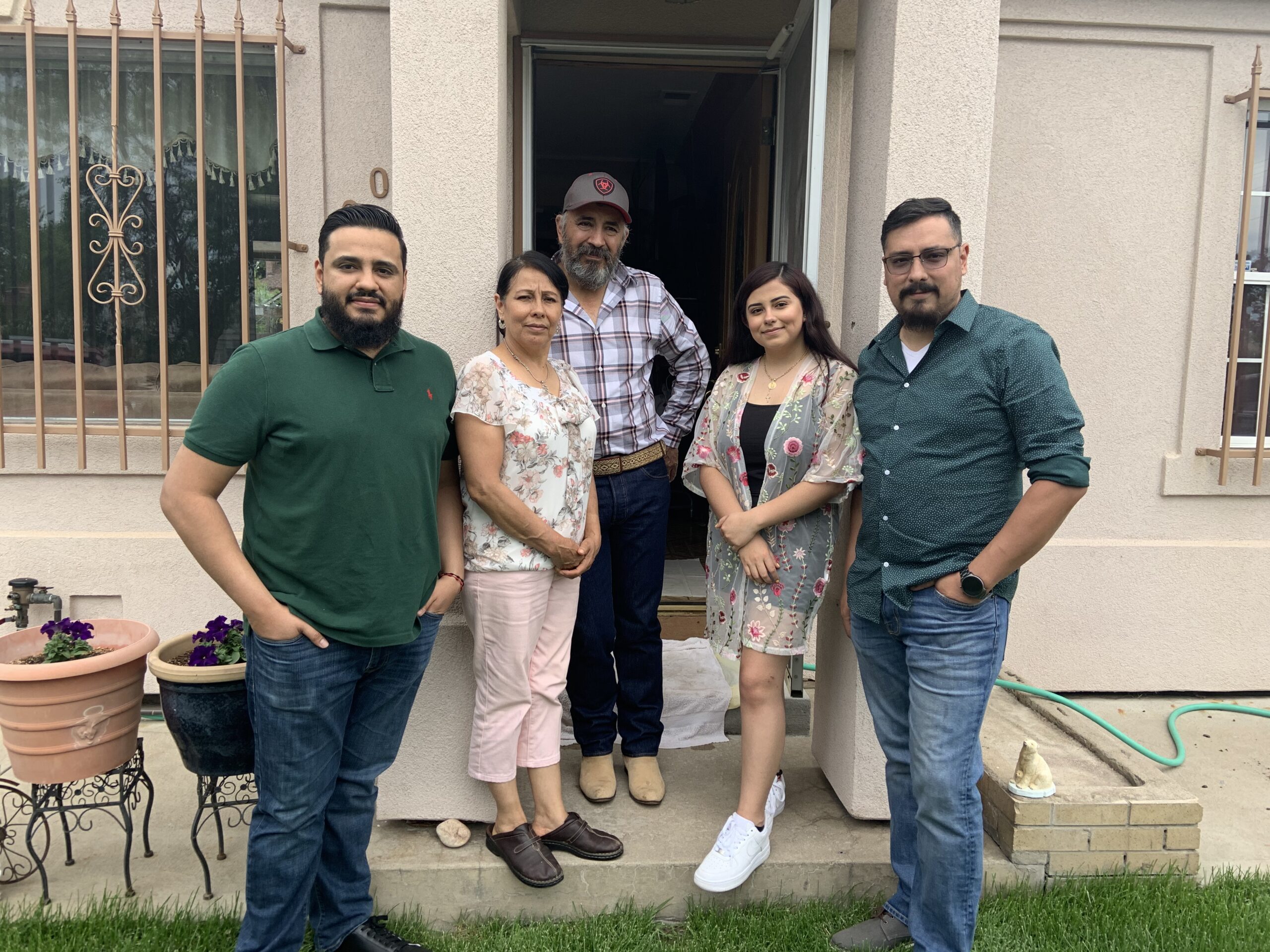3. Lent: The fast that God wishes – El ayuno que Dios quiere
El ayuno que Dios quiere
El ayuno que yo quiero de ti es éste, dice el Señor:
Que rompas las cadenas injustas
y levantes los yugos opresores;
que liberes a los oprimidos
y rompas todos los yugos;
que compartas tu pan con el hambriento
y abras tu casa al pobre sin techo;
que vistas al desnudo
y no des la espalda a tu propio hermano.
“Liberar a los oprimidos” suena exótico. Cuando vemos refugiados y solicitantes de asilo en Oriente Medio, África e incluso en nuestras fronteras, reconocemos a las personas oprimidas. He visitado y ofrecido misas en prisiones y centros de detención de inmigrantes. He trabajado con personas atrapadas en la opresiva realidad de la inmigración en este país. Jesús abre nuestra atención a más de los encarcelados, hablando de cuidar a los hambrientos, a los sin casa, a los pobres. Cuando dice que no “des la espalda a tu propio hermano”.
Los pobres y las personas marginadas de la sociedad reciben cierta atención. Tenemos grupos maravillosos en nuestras parroquias y diócesis que ofrecen comida, posada y servicio a los pobres. Las sociedades Vincent de Paul, Caridad Católica y otros grupos relacionados con la iglesia alimentan a los pobres a través de bancos de comida y loches por los pobres. Deseamos hacer más, pero ¿consideramos su cuidado espiritual?
El Papa Francisco expresa preocupación por la “falta de cuidado espiritual” de los pobres. (EG 200) Cuando considero el cuidado espiritual de los pobres, por favor comprendan que nuestro cuidado no es hacer proselitismo. El Papa Francisco es muy claro sobre la tradición católica de evangelización. Afirma claramente que la evangelización no es proselitismo. “No es haciendo proselitismo que la Iglesia crece, sino “por atracción”. (EG 15)
El Papa Francisco dice que los pobres “necesitan a Dios y no debemos dejar de ofrecerles su amistad, su bendición, su palabra, la celebración de los sacramentos”. (EG 200) En mi libro, La Fe del Migrante, exploro las dificultades que tienen los migrantes para recibir los sacramentos en muchas de nuestras parroquias. Cuando comencé un programa de verano para trabajadores migrantes en la cosecha de cerezas de Oregon. Preparamos a los jóvenes, que estaban por encima de la edad normal para recibir la Eucaristía, para su Primera Comunión. Ese programa me dio a conocer que la mayoría de nuestros materiales catequéticos no están orientados a las necesidades especiales de las personas en movilidad.
Abordaré muchas de estas necesidades especiales en los próximos blogs. Cierro este blog con una invitación para ayudar a desarrollar un catecismo para personas con oportunidades limitadas de participar en programas ordinarios de las iglesias locales.
The fast that God wishes
This, rather, is the fasting that I wish:
releasing those bound unjustly,
untying the thongs of the yoke;
Setting free the oppressed,
breaking every yoke;
Sharing your bread with the hungry,
sheltering the oppressed and the homeless;
Clothing the naked when you see them,
and not turning your back on your own.
“Setting free the oppressed” sounds exotic. When we see refugees and asylum seekers in the Middle East, Africa and even on our borders, we recognize people who are oppressed. I have visited and offered Masses in prisons and immigration detention centers. I have worked with people caught in the oppressive immigration reality in this country. Jesus goes beyond those imprisoned, speaking of caring for the hungry, the homeless, the poor. When he says not to turn your “back on your own.”
The poor and people on the margins of society receive some attention. We have wonderful groups in our parishes and dioceses who offer, food, shelter and services to the poor. The Vincent de Paul societies, Catholic Charities and other church related groups feed the poor through food banks and soup kitchens. We wish we could do more, but do we consider their spiritual care?
Pope Francis expresses concern for the “lack of spiritual care” for the poor. (EG 200) When I consider the spiritual care of the poor, please understand that our care is not to be engaged in proselytization. Pope Francis is very clear about Catholic tradition of evangelization. He clearly states that evangelization is not proselytization. “It is not by proselytizing that the Church grows, but “by attraction.” (EG 15)
Pope Francis says that the poor “need God and we must not fail to offer them his friendship, his blessing, his word, the celebration of the sacraments.” (EG 200) In my book, Migrant Faith, I explore the difficulties that migrants have in receiving the sacraments in many of our parishes. When I began a summer program for migrant workers in the cherry harvest the Oregon. We prepared young people, who were above the normal age for reception of the Eucharist, for their First Communion. That program introduced me to an awareness that most of our catechetical materials are not geared to special needs of people of mobility.
I will address many of these special needs in coming blogs. I close this blog with an invitation to help in developing a catechism for people with limited opportunity to participate in ordinary programs of local churches.
En busca de ayuda
Empecé a escribir estos blogs hace seis meses y no estoy seguro de quién esta leyendo o siguiendo mis reflexiones. Quiero invitar a líderes religiosos, catequistas, padres y jóvenes interesados en ayudar a escribir un catecismo para preparar a los jóvenes en circunstancias especiales para su Primera Comunión. He puesto mi libro, Migrant Faith, disponible en la página de Recursos de este sitio web. Está disponible en inglés y español. La historia de cómo los trabajadores agrícolas migrantes dieron forma a mi ministerio y mi preocupación de que la Iglesia brinde un mejor acceso a la gracia de los sacramentos es la base del libro.
Hace veinte años, un grupo de misioneros laicos muy talentosos se unió a nuestro equipo misionero bilingüe redentorista. Uno de los miembros del equipo era una psicóloga haciendo un año sabático en los EE. UU. Otro era maestra en México durante dieciocho años y dos alumnos de la Universidad de Nebraska. Durante el verano, ofrecimos dos misiones, una en Nebraska y otra en Oregon. El equipo de la misión revisó varios catecismos bilingües y decidió que todos tenían aspectos buenos, pero que cada uno tenía inconvenientes para usar con los estudiantes que estábamos a punto de conocer. Decidieron escribir su propio manual y preparar lecciones en consecuencia.
Al año siguiente, se me unió un nuevo equipo y apreció los materiales del año anterior, pero descubrió que necesitaban adaptar el programa a sus habilidades y experiencia. La creatividad y la energía de cada equipo misionero hicieron de nuestras misiones de verano una bendición y una aventura cada año. Debido a COVID, muchos de los programas ordinarios de las parroquias han necesitado revisión. Mi proyecto para la Cuaresma es escribir un catecismo que involucre a los padres y padrinos (padrinos) en la preparación de su hijo para la Primera Comunión. Esto puede ser útil para familias que se sientan incómodas con la participación de sus hijos en las aulas en el futuro y especialmente útil para las personas con movilidad y los pobres.
Quiero consejos y opiniones de los lectores de este blog. Por eso, pido a los interesados en poner la gracia del sacramento a disposición de las personas de la periferia que entran una conversación conmigo. Como no he tenido muchos comentarios directamente a este blog, pido a los interesados que me envíen un correo electrónico a [email protected]
Por favor, escriba una nota explicando por qué ha respondido a mi solicitud. Sé que hay personas leyendo esta columna, pero no estoy seguro de cómo involucrar a las personas en una conversación sobre la misión a los migrantes. Por favor déjeme saber su interés, y si desea que lo llame, puede incluir su número de teléfono. En próximos días voy a pedir unas preguntas para iniciar un diálogo sobre que consideramos esencial en preparación para la Primera Comunión.
Paz y que Dios te acompañe en tu camino de Cuaresma.
Padre Miguel McAndrew, C.SS.R.
Padre Migrante
Looking for help
I have been writing these blogs for six months, and I am uncertain who may be reading or following my reflections. I want to invite religious leaders, catechists, parents and youth interested in helping write a catechism to prepare youth in special circumstances for their First Communion. I have made my book, Migrant Faith, available on the Resources page of this website. It is available in English and Spanish. The story of how migrant farm workers shaped my ministry and my concern that the Church provide better access to the grace of sacraments is the foundation of the book.
Twenty years ago, a very gifted group of lay missionaries joined our Redemptorist bilingual mission team. One of the team members was a psychologist on a sabbatical in the U.S. Another taught school in Mexico for eighteen years and two students from the University of Nebraska. During the summer, we had two missions, one in Nebraska and one in Oregon. The mission team reviewed several bilingual catechisms and decided that all of them had aspects that were good, but that each had drawbacks for use with the students we were about to meet. They decided to write their own manual and prepare lessons accordingly.
The following year, a new team joined me and appreciated the materials from the year before, but found that they needed to adapt the program to their skills and experience. The creativity and energy of each mission team made our summer missions a blessing and an adventure each year. Because of COVID, many of the ordinary programs of parishes have needed revision. My project for Lent is to write a catechism involving the parents and padrinos (godparents) in preparing their child for First Communion. This may be helpful for use with families uncomfortable involving their children in classrooms in the future and especially helpful for people of mobility and the poor.
I want advice and opinions from readers of this blog. So, I ask those interested in making the grace of sacrament available to people on the periphery to enter a conversation with me. Since I have not had many comments directly to this blog, I ask for those interested to email me at [email protected]
Please, write a note as to why you have responded to my request. I know that there are people reading this column, but I am uncertain how to engage people in a conversation on the mission to migrants. Please let me know your interest, and if you wish that I call you, you may include your phone number. In the next few days, I will be asking questions about what we believe is essential in preparation for First Communion.
Peace and may God be with you on your Lenten journey.
Fr. Mike McAndrew, C.SS.R.
Padre Migrante
Oh Jesús, tú nos llamas: “Síganme”. Bendice, Señor, a todos los que acogen tu llamado. Puede que el camino no sea fácil, pero tenemos la confianza de que todo es posible si caminamos contigo. Que este viaje nos abra los ojos a las maravillas de tu amor por nosotros. Oramos por toda tu gente, por todos los creyentes e incrédulos, por los líderes y seguidores. Oramos por la sanación, el perdón, la compasión, la justicia y la paz. Oramos para que, al seguirte, nosotros también podamos ser pescadores de hombres. Bendícenos en nuestro viaje.
O Jesus, you call us, “Come after me.” Bless, O Lord, all who welcome your call. The path may not be easy, but we have confidence that all things are possible if we walk with you. May this journey, open our eyes to the wonders of your love for us. We pray for all your people, for all believers and unbelievers, for leaders and followers. We pray for healing, for forgiveness, for compassion, for justice, for peace. We pray that as we follow you, we too can be fishers of men. Bless us on our journey.





